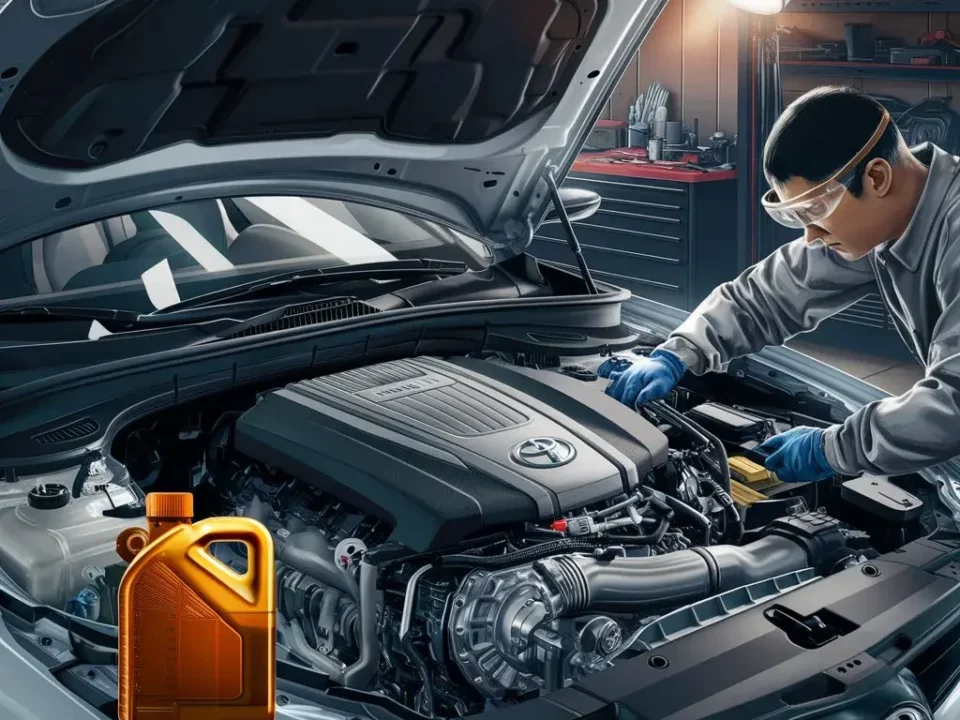
Preventing Engine Oil Sludge: Best Practices for Toyota Owners
July 3, 2024
Understanding Engine Oil Sludge: Causes and How to Avoid Them in Your Toyota
July 3, 2024Engine oil sludge is a significant concern for Toyota repair owners, potentially compromising engine performance and longevity. Addressing this issue effectively involves a combination of preemptive and corrective measures. Regular oil changes using Toyota-recommended synthetic oils play a pivotal role in preventing the buildup of sludge. Additionally, incorporating engine flush treatments can aid in dissolving any existing deposits, thus maintaining engine efficiency. Proper maintenance routines, including timely checks and using a superior oil filter, are crucial in sustaining the engine’s health. Exploring these solutions further can unveil more about their practical impacts and subtleties in application specific to Toyota models.
Regular Oil Changes
Regular oil changes are crucial for preventing sludge accumulation in Toyota engines, which can severely impair vehicle performance and longevity. As a dedicated Toyota owner, understanding the specific maintenance schedule for your model is essential. Toyota generally recommends oil changes every 5,000 to 10,000 miles, depending on the vehicle model and the type of oil used.
Adhering to these intervals is not just about keeping your engine running smoothly; it’s about being part of a community of Toyota enthusiasts who value diligence and the pursuit of automotive excellence.
For those in our community who enjoy a more hands-on approach, learning to perform an oil change can be a rewarding skill. It involves draining the old oil, replacing the oil filter, and filling the engine with fresh oil. This process ensures that your Toyota’s engine is not just free of contaminants that could form sludge but is also operating at its peak efficiency.
Use High-Quality Oil
Using high-quality oil is essential for maximizing the longevity and efficiency of Toyota engines, as it better resists the formation of sludge compared to lower-grade alternatives. High-performance synthetic oils, specifically designed for Toyota’s engine requirements, not only enhance performance but also contribute significantly to maintaining a cleaner engine. These oils possess superior viscosity stability and thermal breakdown resistance, which are critical in preventing the accumulation of harmful deposits.
For Toyota owners, selecting the right oil involves checking the vehicle’s manual for the manufacturer’s recommended oil specifications. Toyota typically recommends oils that comply with their stringent specifications, often denoted as ‘Toyota Genuine Motor Oil’ or oils that meet the ILSAC GF-5 standard, which ensures a certain level of quality and engine protection. This standard is crucial as it encompasses aspects like fuel economy, volatility, and wear protection, ensuring that the oil maintains its protective properties even under extreme conditions.
Engine Flush Treatments
Engine flush treatments can be a crucial step in maintaining Toyota vehicles, particularly when addressing the issue of oil sludge buildup. These treatments involve adding a chemical cleaner to the oil-filled engine, which is then idled for a short period to allow the cleaner to circulate. This process helps dissolve sludge and varnish deposits, which are then expelled with the old oil during a subsequent oil change.
For Toyota owners, it’s essential to choose a flush product that is compatible with their vehicle’s engine. Products specifically designed for Toyota engines often provide a balance of effectiveness and safety, ensuring no harm to engine components. It’s advisable to consult with a Toyota service expert or refer to the owner’s manual to select the appropriate flush treatment.
Using engine flush treatments not only extends the lifespan of the engine but also enhances its performance. Sludge can significantly impede the efficiency of your engine, reducing fuel economy and increasing the risk of engine failure. Regularly scheduled flush treatments ensure that the engine maintains optimal functionality and remains a reliable part of your Toyota experience.
This proactive approach is a testament to the commitment of being part of the Toyota family, prioritising long-term vehicle health and performance.
Timely Maintenance Checks
Beyond the benefits of engine flush treatments, adhering to a schedule of timely maintenance checks is key to ensuring the ongoing health and performance of your Toyota vehicle. Regularly scheduled maintenance not only prevents the buildup of harmful engine oil sludge but also fosters a sense of community among Toyota owners who value the longevity and reliability of their vehicles.
To optimize your Toyota’s performance and prevent the common issue of oil sludge, consider the following maintenance strategies:
- Regular Oil Changes: Follow Toyota’s recommended oil change intervals, typically found in your owner’s manual. Using the correct oil grade and specification is crucial for maintaining engine cleanliness and efficiency.
- Comprehensive Engine Diagnostics: Utilize diagnostic tools to check for early signs of sludge buildup. Toyota dealerships have specialized equipment designed to detect underlying issues before they escalate.
- Attend Scheduled Service Appointments: Make it a habit to visit your authorized Toyota service center. Trained technicians can spot potential problems that are not obvious to the average driver and suggest preventive measures.
Upgrade Oil Filter
Consider upgrading to a high-performance oil filter to enhance your Toyota’s engine protection against sludge accumulation. High-performance filters are designed with superior filtration capabilities that can trap smaller contaminants and sludge particles more effectively than standard filters. This ensures a cleaner oil supply, crucial for maintaining the engine’s optimal performance and longevity.
For Toyota owners, selecting the right filter involves understanding the specific requirements of your vehicle’s engine. Toyota often recommends specific filter brands and models that are optimized for their engines. High-quality brands like Toyota Genuine Parts, Mobil 1, and Bosch provide options that meet or exceed the manufacturer’s specifications. These filters typically feature synthetic media, which has a finer mesh than traditional paper filters, allowing for enhanced filtration without restricting oil flow.
Implementing a high-performance oil filter not only preserves the integrity of your engine but also fosters a sense of belonging and commitment to maintaining your vehicle at its best. Regular replacement of the oil filter, as per Toyota’s maintenance schedule, will ensure that your engine remains in peak condition, safeguarding your investment and keeping your Toyota running smoothly for years to come.
In conclusion, the battle against engine oil sludge in Toyota repair is won through a strategic quintet of interventions.
Regular oil changes serve as the cornerstone, bolstered by the use of premium, specification-compliant oils.
Engine flush treatments act as a cleansing tide, washing away residues of complacency.
Timely maintenance checks and superior oil filters fortify the engine’s defenses, ensuring that Toyota vehicles continue to operate at their pinnacle of efficiency and reliability.
Next article Prev article



